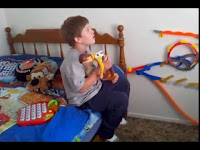 “My 8 y.o. son has autism (high-functioning) and is constantly disrespectful, talks back, is stubborn. He thinks that we (parents) are 'being mean' to him. We have tried reward charts, try to be encouraging and positive, have taken away computer and TV, removing the thing he is playing with, setting him in a corner, doing extra chores, and NOTHING works. We are just so discouraged because nothing seems to be getting through. We have read dozens of books and seemingly tried everything. Please help. I am going insane!”
“My 8 y.o. son has autism (high-functioning) and is constantly disrespectful, talks back, is stubborn. He thinks that we (parents) are 'being mean' to him. We have tried reward charts, try to be encouraging and positive, have taken away computer and TV, removing the thing he is playing with, setting him in a corner, doing extra chores, and NOTHING works. We are just so discouraged because nothing seems to be getting through. We have read dozens of books and seemingly tried everything. Please help. I am going insane!”Traditional disciplinary techniques often fail to produce the desired results for kids with High-Functioning Autism (HFA) and Asperger’s (AS), mainly because these “special needs” children are unable to appreciate the consequences of their actions. Consequently, punitive measures are apt to exacerbate the type of behavior the punishment is intended to reduce.
Disciplining young people displaying autism-related behaviors will require an approach that is somewhat unique to that of “typical” children. Finding the balance between understanding the needs of the HFA or AS youngster, and the disciplinary strategy that is age-appropriate and situationally-necessary will be achievable when applying some of the strategies listed below. These strategies can be implemented at home, school, and in other public settings.
==> How To Prevent Meltdowns and Tantrums In Children With High-Functioning Autism and Asperger's
Crucial disciplinary guidelines for parents [and teachers]:
1. A short list of rules – along with a visual depiction of each rule – should become your youngster's property, and depending upon the situation, should be kept in his pocket for ready reference.
2. Active ignoring is a good consequence for misbehavior meant to get your attention. This means not rewarding “bad behavior” with your attention – even if it's negative attention (e.g., scolding or yelling).
3. After disciplining your youngster for doing something wrong, always offer a “substitute behavior” (e.g., if she is hitting you to get your attention, work on replacing that with getting your attention by tapping your shoulder).
4. Before you transition from one activity to another, or approach a situation where behavior may deteriorate, discuss with your youngster what will happen, review the family rules, and remind him of the consequences (both good and bad) of any misbehavior. This information may need to be broken down into a few simple instructions and repeated often.
5. Change (not “lower”) your standards. With an HFA or AS youngster, parents need to learn to live in the present moment. The milestones of your youngster’s life are less defined, and the future less predictable (though your youngster may surprise you). In the meantime, set the standards for your youngster at an appropriate level.
6. Children with HFA and AS tend to enjoy being isolated, because it is less stressful for them and they do not have to socialize with others. Therefore, time-outs can actually be a positive experience unless modified slightly. Removing kids from something fun is a better alternative. For example, if the youngster loves to play games on his iPad, the iPad can go in a time-out area – for a period of 15 minutes at most, otherwise the child will feel as though he has lost the privilege for an eternity and will act-out accordingly.
7. Create a list of behaviors your youngster CAN’T control due to his disorder. The list may include items such as repetitive behaviors, poor peer relations or lack of social skills, being easily distracted, sensory sensitivities, obsessive/compulsive tendencies, meltdowns, etc. These are the behaviors that your child should NEVER be punished for. Your youngster will require help and guidance to overcome these issues.
8. Don’t assume your youngster will automatically transfer and apply information previously learned in one environment to a new situation that, in your mind, is remarkably similar. For kids on the autism spectrum, a new situation is a new situation.
9. Enlist the help of your child in creating a “consequence plan.” For each negative behavior you have identified as inappropriate, the two of you decide on a consequence. Discipline needs to be clear, concise, consistent and calm. When your youngster misbehaves, tell her in a few words what she did wrong, and tell her the consequence (which she agreed to in the planning stage).
10. For kids on the spectrum, it is important that the consequence or reward immediately follow the behavior in order to have the greatest effect and opportunity to teach.
==> How To Prevent Meltdowns and Tantrums In Children With High-Functioning Autism and Asperger's
11. Kids with HFA and AS require more exposure to discipline before they begin to understand expectations. Parents must follow through and apply discipline EVERY time there is an incident in order to effectively send a message. Kids who have trouble learning respond very well to consistent structure and limits. But for this to work, moms and dads must be consistent.
12. Kids on the spectrum thrive on clear rules. Thus, post a list of unacceptable behaviors and their consequences in a prominent location. For younger kids who can’t read yet, the rules can be reviewed periodically, and the list should have visual illustrations to demonstrate the unacceptable behaviors and consequences associated with them.
13. Look for small opportunities to deliberately allow your youngster to make mistakes for which you can set aside “discipline-teaching” time. It will be a learning process for you and your youngster.
14. Never assume that your HFA or AS child will understand appropriate social behavior under a wide variety of specific circumstances, and when that doesn't occur, discipline in the moment.
15. Prioritize problematic behaviors rather than trying to fight multiple battles at one time. List the top 3 behaviors that you feel are most deserving of attention. This is an important step, because (a) many of the smaller problems will take care of themselves once the bigger issues have been resolved, and (b) some behaviors need an intervention or therapy in order to be eliminated rather than simple disciplinary techniques.
16. Reset your anger buttons. Your autistic youngster will inevitably do some things that will frustrate the hell out of you, but getting angry with him will only worsen things. So, when you catch yourself starting to get angry – YOU take a time-out. If you’re still angry after the time-out – don’t show it! Put on a “poker face.”
17. Social stories, developed to help HFA and AS kids understand difficult situations, are particularly helpful for teaching appropriate behaviors.
18. Through role play, you can provide your youngster with alternatives to problematic behaviors (e.g., hitting, yelling, throwing, etc.).
19. View all problematic behaviors as “signals of needs.” Everything an autistic youngster does tells you something about what she needs.
20. While it is true you have to change your expectations of your HFA or AS youngster, you don’t have to lower your standards of discipline. It’s tempting to get lax and let a “special needs” child get by with behaviors you wouldn’t tolerate in your other kids. Your youngster needs to know, early on, what behaviors you expect. Many moms and dads wait too long to start “behavior training.” It’s much harder to redirect a 170 pound teenager than a 45 pound 3rd grader.
21. Your HFA or AS youngster likely has triggers that can cause her to become distressed, which may result in a meltdown. Watch carefully for these triggers and distract her when you sense an outburst coming on. For instance, if she thrives on a schedule and you need to change it for some reason, let her know carefully and watch for signs of a meltdown during the change.
22. If parenting strategies fall short and do not yield the desired outcomes, then seeking outside assistance from a therapist who specializes in autism spectrum disorders is highly recommended. There are various standard courses of treatment, with each treatment modality addressing a different set of issues. Some of the most common treatment options include:
- Applied Behavioral Analysis is a form of therapy used to teach basic skills in many different areas.
- Cognitive-behavioral therapy is used to treat the emotional side of HFA and AS (e.g., anxiety, depression, obsessions, etc.).
- Occupational therapy is basically used to teach independence. Grasp, handwriting, social skills, and play skills are often included.
- Sensory integration therapy may be included by the occupational therapist. This therapy helps get your youngster’s sensory systems in synch.
- Physical therapy addresses the physical awkwardness that sometimes comes with HFA and AS.
- Social skills training is a therapy that teaches kids on the spectrum how to relate to others, making and keeping friends, how to recognize social cues and gestures, and other details such as personal space and understanding slang.
- Speech/language therapy covers speech articulation as well as pragmatics, or fluency. Language therapy covers social communication, and in some cases, social skills. Speech/language therapy will help your youngster learn to communicate verbally or nonverbally, if necessary, with the use of picture exchange and/or sign language. When a child can use words to express his anger and frustration, problematic behaviors are greatly reduced.
==> How To Prevent Meltdowns and Tantrums In Children With High-Functioning Autism and Asperger's
23. In worst case scenarios, behavior problems may need to be addressed (in part) through the use of medication. Some medications that may be prescribed include antidepressants, antipsychotics, and stimulants.
24. There are many alternative approaches to treating symptoms associated with HFA and AS. One such approach is Complementary and Alternative Medicine (CAM), which is defined as “a group of diverse medical and health care systems, practices, and products that are not presently considered to be part of conventional medicine.” CAM therapies used to treat HFA and AS have been categorized as biological and nonbiological:
- Examples of biological therapies include: (a) immunoregulatory interventions (e.g., dietary restriction of food allergens or administration of immunoglobulin or antiviral agents), (b) gastrointestinal treatments (e.g., digestive enzymes, antifungal agents, probiotics, yeast-free diet, gluten/casein-free diet, vancomycin), (c) dietary supplement regimens that are supposed to act by modulating neurotransmission or through immune factors (e.g., vitamin A, vitamin C, vitamin B6 and magnesium, folic acid, folinic acid, vitamin B12, dimethylglycine and trimethylglycine, carnosine, omega-3 fatty acids, inositol, various minerals, etc.), and (d) detoxification therapies (e.g., chelation).
- Examples of nonbiological interventions include treatments such as auditory integration training, behavioral optometry, craniosacral manipulation, dolphin-assisted therapy, equine-assisted therapy, facilitated communication, and music therapy.
HFA and AS children need limits and structure much more than “typical” kids do. When they can predict what will happen next in their day, they feel confident and safe. Of course, they will test the boundaries. But, it's up to parents to affirm that these standards are important – and to let their youngster know that they believe he or she can meet them.
More resources for parents of children and teens with High-Functioning Autism and Asperger's:
==> How To Prevent Meltdowns and Tantrums In Children With High-Functioning Autism and Asperger's
==> Parenting System that Significantly Reduces Defiant Behavior in Teens with Aspergers and High-Functioning Autism
==> Launching Adult Children with Asperger's and High-Functioning Autism: Guide for Parents Who Want to Promote Self-Reliance
==> Teaching Social Skills and Emotion Management to Children and Teens with Asperger's and High-Functioning Autism
==> Parenting Children and Teens with High-Functioning Autism: Comprehensive Handbook
==> Unraveling The Mystery Behind Asperger's and High-Functioning Autism: Audio Book
==> Parenting System that Reduces Problematic Behavior in Children with Asperger's and High-Functioning Autism
COMMENTS:
• Anonymous said… A couple of things to try. We did this with my son, who had an awful time getting up in the morning. It became a battle every day, just to get him out of bed. 1. Video him and show him what his behavior looks like. He won't like it, and prepare yourself for a meltdown over that in itself. 2. Talk about the video once he's calmed down and talk about the 'other' ways he could have handled the situations. For example, better responses instead of backtalk, a reaction that is different that a tantrum. 3. Take those situations and turn them into role-playing - a way to actually practice what should happen, rather than what is happening. 4. Once you've role-played it, video it again and play it back for him. He will see a positive way that he's changed his behavior. The theory behind this is that you are replacing the negative images and reactions that he 'sees' in his head with the positive ones. It may take a few times to replace the action when the time comes, but if he re-views the positive video, it can help him literally see his behavior in a new way.
• Anonymous said… Give choices focus on positive ignore negative.
• Anonymous said… I say, I will. Or speak with you as long as you're talking to me like that. (After over explaining why it's not okay.)
• Anonymous said… My 5 year old 😞 I'm going to try some of these techniques
• Anonymous said… My 9 year old is the same way. He needs to become a professional negotiator for a big business someday. He is so good at it, no matter how small they requests from me or his dad. Always an argument, refusal, avoidance or negotiation behaviors happening at our house. It drains my energy.
• Anonymous said… My son is still young and about to turn six so thank God I have not run into this – yet – I'm coming into this with my eyes wide open now based on all of the other parents experience with their teenagers . However I have been reading and reading for at least a year on every possible autism site I can get my hands on. Although I do not know your son and I do not know what you have tried – I would default to diet and get cannabis with THC. Although there are some kids that the parents have trouble finding the right Balance or strain of cannabis with – I have heard many times more successes been failures with diet, supplements and also cannabis with THC
• Anonymous said… Positive reinforcement, confidence building, talk therapy (not always in the moment if he's angry). Talk and give some one on one time half an hour a day. Do something they like with them for 30 minutes a day, relationship building / trust building. Let them know what they are doing right. Role play / role model / script conversations that are polite. Make your goal for the month Kindness and reward everytime he is kind. Make a goal (item) he wants to work towards and everytime he's kind, genuinely, give him a reward. I used to also give $10 (big money) whenever I got an unsolicited compliment on my son. I would always share with him what the other person said so he took pride and made sure to "shine that part on" and know "this is where I shine". Good luck, give positive feedback and know that you are supposed to ignore a lot of bad behavior (it's weird to do at first). Pick and chose your battles always and it sounds more like an ADHD problem. My child with Autism also has this Dx. You have to encourage, especially if it "hormonal" time because think of our Hormonal stages and then times that by 10. They feel things more intensely. Physical outlets/sports always. Also, "Downtime" 15 minutes break. 15 minutes work on this. 15 minutes break. 15 minutes get this organized. They frrustrate themselves. Mood boosters help.
• Anonymous said… Video. Try video. It lets him see another perspective and sometimes is an excellent teaching tool.
• Anonymous said… We had exactly the same problem with my now 15 year old son, tried literally everything we could think of. Its only now that he is on anxiety meds (Resperidone) that he is almost a different child. I'm not condoning drug use for behaviour but for us it was the best decision we could have made. Perhaps look at the symptoms of ODD as well.
Post your comment below…



.jpg)


